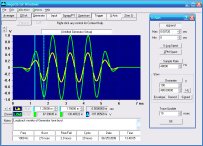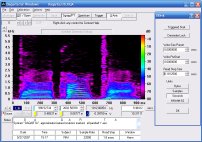![[LogoShip]](logo5.png)
Software for Windows
Science with your Sound Card!


Features:
Oscilloscope
Spectrum Analyzer
8-Channel
Signal Generator
(Absolutely FREE!)
Spectrogram
Pitch Tracker
Pitch-to-MIDI
DaqMusiq Generator
(Free Music... Forever!)
Engine Simulator
LCR Meter
Remote Operation
DC Measurements
True RMS Voltmeter
Sound Level Meter
Frequency Counter
Period
Event
Spectral Event
Temperature
Pressure
MHz Frequencies
Data Logger
Waveform Averager
Histogram
Post-Stimulus Time
Histogram (PSTH)
THD Meter
IMD Meter
Precision Phase Meter
Pulse Meter
Macro System
Multi-Trace Arrays
Trigger Controls
Auto-Calibration
Spectral Peak Track
Spectrum Limit Testing
Direct-to-Disk Recording
Accessibility
Data Logger
Waveform Averager
Histogram
Post-Stimulus Time
Histogram (PSTH)
THD Meter
IMD Meter
Precision Phase Meter
Pulse Meter
Macro System
Multi-Trace Arrays
Trigger Controls
Auto-Calibration
Spectral Peak Track
Spectrum Limit Testing
Direct-to-Disk Recording
Accessibility
Applications:
Frequency response
Distortion measurement
Speech and music
Microphone calibration
Loudspeaker test
Auditory phenomena
Musical instrument tuning
Animal sound
Evoked potentials
Rotating machinery
Automotive
Product test
Contact us about
your application!
Mashup.DQM MIDI Setup
- Play Sample: Mashup (187 KB)
When this setup is loaded, right-clicking on the Pitch-to-MIDI title bar or any non-control portion of the dialog will open Help at this topic.
Mashup.DQM is an extension of the concept used in the "Glossy" setup family. Those are based on 8 concurrent voices, each playing a different random melody. Here, 8 concurrent voices are each playing a different traditional melody:
Frere Jacques
Alouette
Amazing Grace
When the Saints Come Marching In
Joshua Fought the Battle of Jericho
This Old Man
Take Me Out to the Ball Game
Pomp and Circumstance
Although only the melody lines are used in Mashup.DQM, each song is also included separately in Daqarta as a complete performance, including chords.
For Mashup use, the melody for each voice has been transposed to the key of C by means of its Pattern Key control. Each melody is a different length, and each starts at a random location (somewhere between note 30 and 60) chosen at the beginning of the performance. When each melody reaches the end, it repeats from its proper start. Since the melody lengths are different, there is never any lasting synchrony between them.
Each voice plays for a randomly-selected 40-60 beats, after which the instrument is randomly changed. The voice may also be randomly shifted an octave higher or lower than the default. Then the process repeats with another randomly-selected 40-60 beats. This continues until you manually end the performance. All voices are independent, including their random values.
You might think this would be total chaos, but it sounds suprisingly good. Sometimes you can briefly pick out an individual melody if it is using an instrument that is distinctively different from rest, but often they all seem interwoven. (Note that the songs used for this were chosen arbitrarily... no attempt was made to guess which ones might work well together.)
Here is the Changes script listing for Voice 1:
;Frere Jacques (D) ;Originally in the key of D
p1=?(30,60) ;Start at random position
{! ;Repeat loop forever
oL="Frere Jacques" ;Show name of song
I1=?(0,118) ;Random Instrument
Y1=?(-1,1)*12+58 ;Random octave
;W=87 ;Full melody length
W=?(40,60) ;Wait 40-60 beats
} ;Repeat infinite loop
Most of the above should be self-explanatory from the comments and links, but the Y1=?(-1,1)*12+58 random octave may not be clear. The Y1 command sets the Pattern Key for Voice 1. The default value is MIDI note number 58, which is shown as A# (more commonly known as B flat). That value was chosen to transpose this song, which was originally in the key of D, into the key of C. (See the Pattern Key topic for more on transposition.)
To transpose this default up or down by an octave, 12 semitones (MIDI note numbers) must be added to or subtracted from it. The ?(-1,1) term produces a random integer between -1 and +1, namely -1, 0, or +1. After multiplying by 12 this becomes -12, 0, or +12, which is then added to the default 58 value.
The other voices are similar, but since they have different original keys (shown in parentheses in the initial comment line), they have different default Pattern Key values.
Voice 2:
;Alouette (F)
p2=?(30,60)
{!
oL="Alouette"
I2=?(0,118)
Y2=?(-1,1)*12+67
;W=119
W=?(40,60)
}
Voice 3:
;Amazing Grace (G)
p3=?(30,60)
{!
oL="Amazing Grace"
I3=?(0,118)
Y3=?(-1,1)*12+65
;W=191
W=?(40,60)
}
Voice 4:
;When the Saints Come Marching In (F)
p4=?(30,60)
{!
oL="Saints Come Marching In"
I4=?(0,118)
Y4=?(-1,1)*12+55
;W=67
W=?(40,60)
}
Voice 5:
;Joshua Fought the Battle of Jericho (G)
p5=?(30,60)
{!
oL="Joshua"
I5=?(0,118)
Y5=?(-1,1)*12+53
;W=193
W=?(40,60)
}
Voice 6:
;This Old Man (F)
p6=?(30,60)
{!
oL="This Old Man"
I6=?(0,118)
Y6=?(-1,1)*12+67
;W=63
W=?(40,60)
}
Voice 7:
;Take Me Out to the Ball Game (D)
p7=?(30,60)
{!
oL="Ball Game"
I7=?(0,118)
Y7=?(-1,1)*12+58
;W=98
W=?(40,60)
}
Voice 8:
;Pomp and Circumstance (B-flat)
p8=?(30,60)
{!
oL="Pomp and Circumstance"
I8=?(0,118)
Y8=?(-1,1)*12+62
;W=160
W=?(40,60)
}
See also Example MIDI Setup Files, MIDI Setup Files, Musical Frontiers, DaqMusiq, KaleidoSynth, Pitch-to-MIDI dialog, Pitch Track Toolbox - Overview, Spectrogram / Pitch Track Controls, Spectrogram / Pitch Track (Sgram/PT)
- Back to AirGuitar.DQM MIDI Setup
- Ahead to Txt2MIDI.DQM MIDI Setup
- Daqarta Help Contents
- Daqarta Help Index
- Daqarta Downloads
- Daqarta Home Page
- Purchase Daqarta
Questions? Comments? Contact us!
We respond to ALL inquiries, typically within 24 hrs.INTERSTELLAR RESEARCH:
Over 35 Years of Innovative Instrumentation
© Copyright 2007 - 2023 by Interstellar Research
All rights reserved